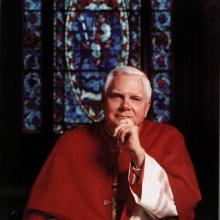Cardinal Bernard Law
The election of Pope Francis in March heralded a season of surprises for the Catholic Church, but perhaps none so unexpected – and unsettling for conservatives – as the re-emergence of the late Chicago Cardinal Joseph Bernardin as a model for the American Catholic future.
While there is no indication that Francis knows the writings of Bernardin, who died in 1996, many say the pope’s remarks repeatedly evoke Bernardin’s signature teachings on the “consistent ethic of life” – the view that church doctrine champions the poor and vulnerable from womb to tomb – and on finding “common ground” to heal divisions in the church.
When the Vatican last month announced a doctrinal crackdown on the leadership organization representing most of the 57,000 nuns in the U.S., the sisters said they were “stunned” by the move. Many American Catholics, meanwhile, were angry at what they saw as Rome bullying women whose lives of service have endeared them to the public.
Vatican watchers also were perplexed since a broader, parallel investigation of women’s religious orders in the U.S. was resolved amicably after an initial clash. That seemed to augur a more diplomatic approach by the Vatican to concerns that American nuns were not sufficiently orthodox.
Now it turns out that conservative American churchmen living in Rome—including disgraced former Boston Cardinal Bernard Law—were key players in pushing the hostile takeover of the Leadership Conference of Women Religious, or LCWR, which they have long viewed with suspicion for emphasizing social justice work over loyalty to the hierarchy and issues like abortion and gay marriage.

